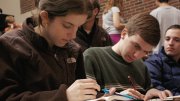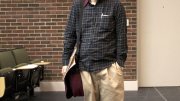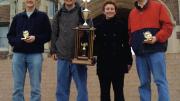It’s a sport where the mind is the only muscle worth working, where players flaunt their ability to memorize textbooks, and where hand exercises have been prescribed as a means of improving buzzer speed. It’s called Quiz Bowl. And, big surprise, Harvard is good at it.
Led by a cast of characters that includes seniors Kyle Haddad-Fonda, Adam N. Hallowell, Julia Schlozman, and John D. Lesieutre—all four of whom played on the team that won a national Quiz Bowl championship last spring—Harvard’s program has built itself into an organized outfit that boasts a treasurer, fundraising schemes, occasional recruiting efforts, and, says Haddad-Fonda, about 25 regular participants. The current lineup is complemented by such luminaries as sophomore Meryl Federman, who last summer won $75,000 on Jeopardy!; second-year law student Bruce Arthur, who competed as an undergraduate with powerhouse University of Chicago; and freshman Dallas R. Simons, a former star on the high-school circuit.
“The team easily goes 10 or 12 deep,” says Dennis Loo, a Virginia Tech graduate and former Quiz Bowler who, when not acting as the Harvard team’s de facto head coach, supports himself by gambling professionally. “You have any of a dozen people who can be mixed and matched into a top-25 team at nationals. It’s a nice problem to have.”
As a testament to its stability, Harvard is able to field multiple teams at the small tournaments held most weekends on the Northeast Quiz Bowl circuit—a Boston-centered division of the national circuit that, according to current club president Andrew Watkins ’11, includes approximately 15 regularly participating schools, some with multiple squads. The team also travels occasionally to larger tournaments hosted in one of the nation’s six other regional circuits (a group from Harvard recently attended a tournament in Minnesota), and to national competitions (last year’s national championship was held in St. Louis).
Harvard’s current successes are not unprecedented: the team was a top competitor on the national stage in the mid 1990s, and—given its standing as a haven for Presidential Scholars and those with perfect SATs—is traditionally heavy on talent. But the program is also subject to dormant periods, and was menaced by dwindling participation and a lack of organizational enthusiasm as recently as three years ago. The club’s present standing has much to do with Haddad-Fonda, who arrived in town representing one-third of what some call the greatest recruiting class in Quiz Bowl history (the class of 2009 included the captains of the top three high-school teams in the nation). By his sophomore year, the soft-spoken history concentrator had begun recruiting efforts and had organized the Harvard Fall Tournament—a Quiz Bowl competition for high-schoolers. (The registration fees help fund travel and expenses for the Crimson team).
The work has paid dividends. Harvard’s depth and corresponding range of specialties (Lesieutre is expert in mathematics, Federman in literature, Arthur in history) is helpful in a sport that, despite requiring little physical activity, is surprisingly exhausting. Though there are multiple formats, Quiz Bowl is most commonly played in rounds of 20 questions (with each participating team generally supplying a round’s worth as part of its registration). Teams equipped with hand-held buzzers attempt to ring in before their opponents for a chance to answer each question (called a “toss-up”) and its corresponding three-part bonus. Although the answers are short, the toss-ups themselves are typically lengthy, complicated, and delivered at lightning speed. They require a thoroughgoing familiarity with highly academic subject matter in history, science, literature, and the arts (Quiz Bowl’s televised predecessor, College Bowl, faltered in the early 1990s in large part—according to the Quiz Bowl community’s Wikipedia entry—because of concerns about light-weight questions). The best questions have “pyramidality,” with clues arranged in decreasing order of difficulty so better teams can work out the answer sooner. But no matter how good a team is, the heavy-duty material and quick pace of the game take a toll: focus and fatigue can flag even in the half-hour to 45 minutes that it takes to play a round. Schlozman, an art-history specialist, admits to zoning out on questions outside her area so she can save her energy.
Despite the exertions they require, few Quiz Bowl competitions bring substantial material rewards. Winning teams and top individual performers, especially at the smaller tournaments, garner nothing more than used books—a prize that is at once an indicator of the financial state of Quiz Bowl and of the sport’s raw, quirky intellectualism. Still, the emotional payoff for many top players is great. Former club president (and recently minted Rhodes scholar; see page 63) Haddad-Fonda points to the feeling of community that he has encountered during his years on the circuit, beginning in high school. “It’s a fun group of people—a lot of us know each other from high school, from playing on different high-school teams,” he says. “One of the reasons that I like traveling to tournaments is that I like seeing these people. We’re rivals—but we’re also friends.”











